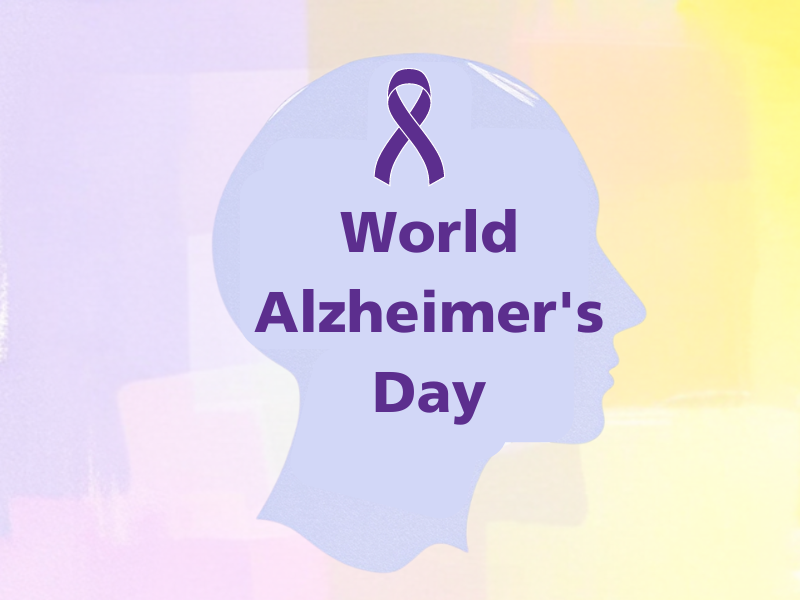By: Nabeela Khan
September 20 2024
 World Alzheimer's Day aims to raise awareness around Alzheimer's disease. (Source: Ishita Das/Logically Facts)
World Alzheimer's Day aims to raise awareness around Alzheimer's disease. (Source: Ishita Das/Logically Facts)
In 2021, nearly 1.8 million people died of Alzheimer’s disease and other forms of dementia, making it the seventh leading cause of death globally. Alzheimer's disease is a neurological condition that leads to loss of memory and impacts cognitive skills. It is considered the most common form of dementia—an umbrella term used to describe a decline in cognitive functioning.
The number of people living with dementia is expected to rise to 139 million by 2050, according to the World Alzheimer’s Report 2023. The World Health Organisation (WHO) states that 55 million people worldwide are living with dementia. Of these, nearly 60-70 percent cases are of Alzheimer’s.
The condition is said to be most feared as the cause of the disorder is not well-known. It is believed to be a combination of genetic, lifestyle, and environmental factors. While there is no immediate cure for it, there are ways to provide care. However, the knowledge gap often gives rise to a number of myths.
This World Alzheimer’s Day, we spoke to Dr Vandana Shetty, a psychiatrist and psychologist who specializes in workplace mental health and rehabilitation, to debunk some of the most common myths around the disease.
While some Alzheimer’s cases are genetic, in most cases, Alzheimer’s doesn't have a single genetic cause. It is influenced by genes and a combination of lifestyle and environmental factors. While it is true that those who have a family history of Alzheimer’s are at a higher risk, it doesn’t mean Alzheimer’s only affects them.
Speaking to Logically Facts, Dr. Vandana Shetty, said, “Most of the cases of Alzheimer's disease are sporadic. A small percentage of around 10 to 15 percent of the cases can be genetic in nature and these kinds of diseases would usually start earlier, before the age of 65 years.”
Explaining the age-related risk factor, an article in the Harvard Health Publishing, the consumer health division of Harvard Medical School, states that age raises the risk of Alzheimer’s more than family history. “People in their 70s have a 5 percent chance of being diagnosed—more than twice that of people in their 60s. Family history raises this by 30 percent, from 5 percent to 6.5 percent. Again, the absolute change is relatively small,” it reads.
With age, it is considered normal for people to forget names or have occasional memory problems. However, Alzheimer’s is more than occasional memory loss as the disease causes brain cells to malfunction and die, according to the Alzheimer’s Association.
Dr. Shetty said, “While forgetting names can be a marker of the onset of Alzheimer’s disease, it is usually not isolated to that. It comes along with a lot of other symptoms, such as finding it difficult to navigate your way through places, having some behavioral changes, mood swings, and also having some difficulty with speech, walking.”
So, it’s important to not isolate a single symptom and associate it with any disease without consulting an expert.
Explaining how aluminum entered the conversation, Dr. Shetty said, “Early in the 1960s and 70s, there was some research which showed that there was a link between aluminum pots and the onset of Alzheimer's. However, a lot of research done after that was not able to show this correlation.”
The Alzheimer’s Association and Alzheimer’s Research U.K. have also noted that after the 1960s and 1970s, studies failed to confirm that aluminum played a role in Alzheimer’s.
Harvard Health Publishing notes that the two terms are often used interchangeably but are different. Dementia is not a specific disease. It is a term used to describe a decline in one’s mental ability, while Alzheimer’s “causes a decline in cognition and memory loss accompanied by changes in mood and behavior.”It is a type of dementia and is considered to be the most common.
Dr. Shetty said, “Dementia is a term that we use for a group of disorders where there is a problem with memory as well as certain other features. It [Alzheimer’s] is the most common kind of dementia, but there are other types of dementia as well, such as frontotemporal dementia and vascular dementia.”